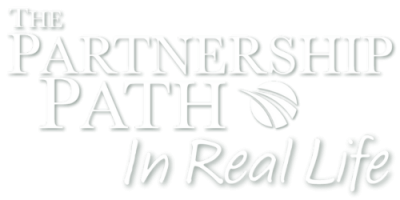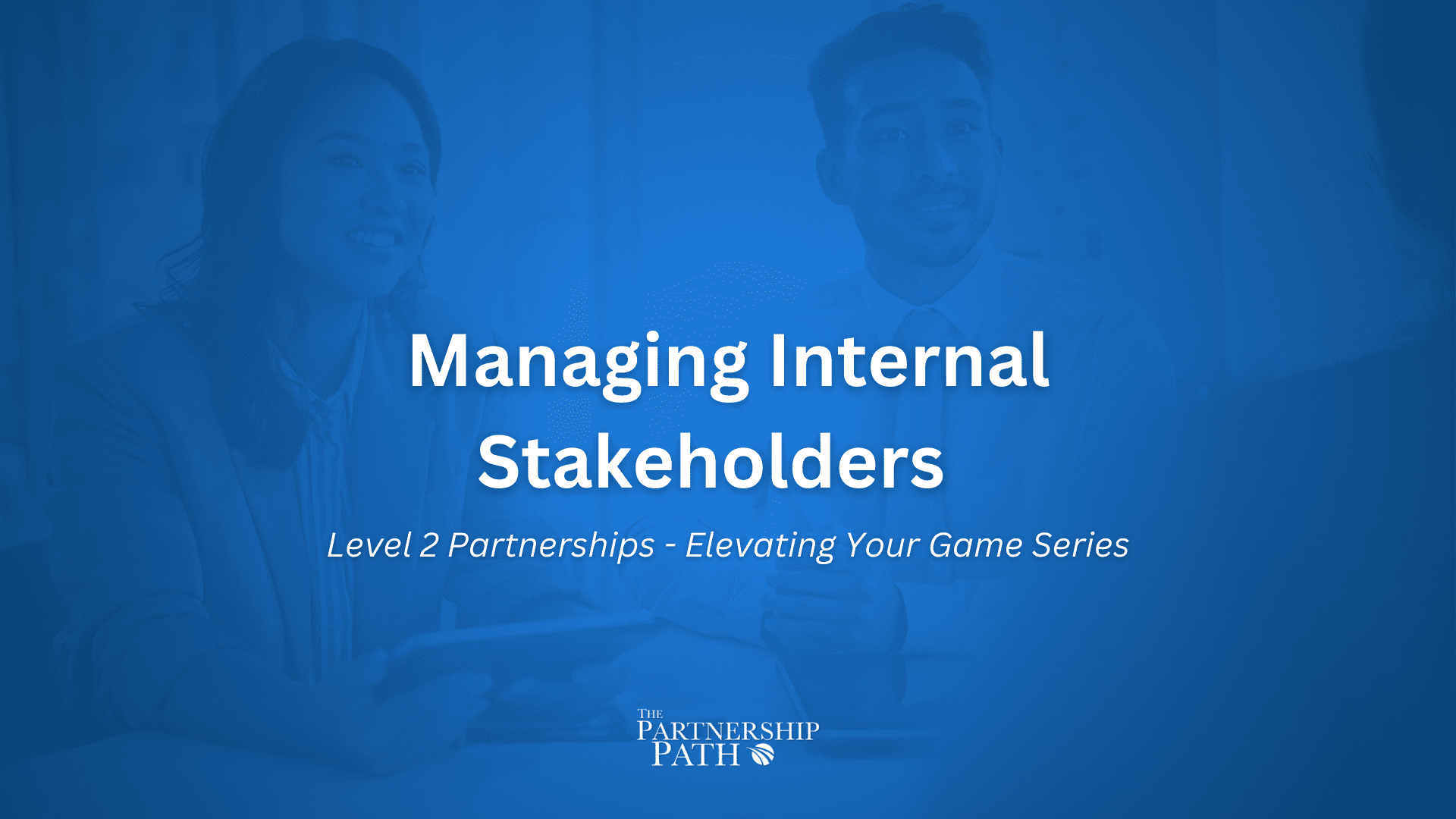IRL Episode
IRL Planning for Partnership Negotiations with Charlotta Bergenstjerna at Infor
Episode Summary
In a world where partnerships can make or break a business, understanding the intricacies of negotiating with partners is crucial. In this episode of The Partnership Path in Real Life, host John Rudow sits down with Channel Account Manager Charlotta Bergenstjerna from Infor to discuss practical strategies for effective negotiations with partners.
Charlotta shares her wealth of experience, emphasizing the importance of maintaining boundaries while aligning both parties’ goals. This discussion is not just informative; it serves as a guide to ensure that partnership negotiations are mutually beneficial, making it invaluable for anyone involved in partner management or negotiations.
Transcript
John (00:01)
Well, hello everybody and welcome to another episode of the Partnership Path in Real Life. Charlotta, welcome to the show. I am so happy to have you on the podcast with us. And before we get going, let me give you a chance to introduce yourself to our listeners. Tell us a little bit about who Charlotte is, what you do, and how long you’ve been working with partners.
Charlotta (00:21)
Thank you so much, John, and thank you for inviting me. My name is Charlotte Sauerberg and I am a Channel Account Manager at Infor. I have been working with channel partners for the last coming up to five years now. yeah, that’s me being with Infor for 15 years.
John (00:41)
Nice. Well, so
if you’ve been working with channel partners for five years, what were you doing before that?
Charlotta (00:47)
I worked in the maintenance business at HealInfo and also our Licence Management Department as a compact analyst.
John (00:49)
Wow.
Okay.
Yeah. So you, you know, the inner workings of how the licensing and, and then renewals work, all that pressure of getting people to renew their licenses. Yeah. Okay. Awesome. Excellent. Well, listen, today’s show is about kind of in real life practices related to getting ready for negotiating with a partner about just about anything. I know you already listened to the episode that Tony and I did. So
Charlotta (01:05)
I
John (01:22)
Let me just start by kind of opening it up to you of, know, what’d you think when you listened to that episode? What stood out for you or, you know, what did it kind of trigger for you when you listened to that episode?
Charlotta (01:33)
I think it was remembering the boundaries of our partnerships really did stand out to me because
John (01:39)
Mmm.
Charlotta (01:45)
Info wants one thing, partners wants another thing. And yeah, sorry, can we?
John (01:54)
That’s all right. Yeah, this is good.
You want me to ask you it again?
Charlotta (02:00)
Yes, let me just read this and have a sip of water because I can feel my throat drying up.
John (02:02)
Okay.
No worries. And by the way, I would say 99 % of the people that listen to this only listen. They don’t actually watch the video. So don’t worry about taking a drink or anything like that either. That’s not a big deal.
Charlotta (02:23)
Okay.
Yes, so let’s go again.
John (02:33)
All right,
so should we just start all the way back at the beginning so that it just flows or do want me to just start with the question?
Charlotta (02:41)
do we have a cutting point? That’s good. That’s my main one.
John (02:47)
Yeah, that’s the
only thing I don’t, I wasn’t really paying attention to that. But so let’s just start at the beginning. I’ll just welcome you to the show and we’ll just start, okay? All right. Well, hello everybody and welcome to the Partnership Path in Real Life. I am so excited to have Charlotte joining us today. And before we get too far though, Charlotte, let me let you introduce yourself to our listeners. Tell us a little bit about who you are, what you do, and how long you’ve been working with partners.
Charlotta (02:51)
No. Yes, we will. Yeah.
Thank you so much, John, and thank you for inviting me. My name is Shalisa Bergenstianna and I am a channel account manager at Infor. I have been working with partners for just coming up to five years now and been with Infor for 15 years.
John (03:28)
Excellent.
Nice, well, if you’ve only been working with partners for five years, what were you doing before that then at Infor? What’s your background coming into this channel management role?
Charlotta (03:41)
I worked for a few years in the maintenance business and most of my time in the license management department as a contract monitor.
John (03:44)
Okay.
Yeah.
Nice. So you know the all the tricks and trade of that, of the background stuff of how licensing really works. That’s, that’s helpful, I think, for the channel as well, because they can sometimes get a little confused about that as well. So awesome. All right. Well, listen, today’s episode is, really about kind of reacting to the episode Tony and I did about planning for negotiations with partners. I know you listened to the episode. So
Let me just start by kind of opening it wide up for you. What was it when you listened to that episode that either kind of stood out to you or sort of made you think or, you know, reminded you of something? Where would you start with that?
Charlotta (04:31)
I think for me, the main thing that stood out is the boundaries between our different partnerships, because it’s not just one partnership. The strategic side and you’ve got the tactical side and within both, you’ve got smaller partnerships. And it’s really easy to sort of lose track of that in your day-to-day job as a partner manager and just focus on what’s right in front of you.
John (04:38)
Yeah.
Yeah.
Charlotta (05:00)
the selling, getting the contracts out, making sure your partners achieve the quotas, et cetera, that we’ve set them.
John (05:09)
Yeah
Charlotta (05:10)
So being reminded of the importance of having the tactical alignment and the strategic alignment is really, really useful.
John (05:21)
Yeah.
Yeah. I used to, I used to think that, well, not used to think, I do think that one of the ways that I kind of always helped remember that was, especially when I had little kids, was that, know, small children asked the question, why all the time, right? We’re going to go here. Why? I’m going to do this. Why? Right. And
it was really helpful for me to always remember that, to constantly ask myself why, from the partner’s perspective, right? Like, hey, the partner’s going to ask me, why does that matter to their business, right? And so that was always one of the little things I always tried to do is kind of pretend like I was a two-year-old, I guess, and ask the question why. What are some of the things when you say that that kind of stood out for you? How do you help remind yourself of that, of kind of making sure that
We’re doing it for the right reasons and that the partner buys in.
Charlotta (06:20)
Well, I think it’s important to remember both sides and not just focus on informal. We want it’s really important to take the partners business needs and their plans into consideration as well, because yes, we own the partner program and we own the solutions that they sell. But they do the selling. They have their own goals and ambitions and, you know,
John (06:29)
Yeah.
Charlotta (06:50)
business plans and we need to make sure that we are aligned as best as we can. And we need to take into consideration, you know, if they’re going through mergers or acquisitions or if they’re hiring a lot of new staff, so if they’ve got high staff turnover, the impact that has on their business and the impact it has on our partnership, as well as, you know, if they’re expanding into new territories and what impact that has, it might be that
They’re looking to expand into a new country, for example. And it takes up a lot of their time and focus. And it sort of, it removes their focus on other parts of their business. So we can then make sure that we can support them in different ways.
John (07:25)
Mm-hmm. Yeah.
Yeah. Yeah. What I love that, by the way, that you listed off so many things that actually really matter in that thought process, right? Of what’s happening in their business. How are they thinking strategically? Mergers, acquisitions, growth, expansion, all that kind of stuff. How what’s your advice to the channel managers or partner account managers out there that are listening? What’s your advice to like
when do you do that and how do you do that research? That may seem like a silly question of how do you do that research, but I actually think that it’s helpful just for people to hear, well, here’s what I do, and I do this once a month or I do it once a quarter or I do it at the beginning of each year. Give me a little bit of insight into Charlotte’s perspective of how do you do that? How do you keep up on what’s going on with your partners?
Charlotta (08:36)
So I have different meeting cadences with my partners for different purposes. have weekly calls with them for pipeline generation or for forecasting purposes, for example. And I might have with some partners and with other partners, I might have the same type of calls on a monthly basis. But I also make sure that I have quarterly business reviews where we go through their, you know, year to day performance.
and make sure that, you know, the pipeline they have in the business that closed means that they will hit the target that we’ve set for them. And then once a year, I tend to have more of a strategic meeting with the, the senior management or the general manager, the CEOs to ensure that we are aligned on a longer term perspective.
John (09:35)
Yeah.
Charlotta (09:36)
So it’s about constant contact with your partners, with the right people within their business. Beginning of the year, we have meetings with the marketing executives to make sure that we support them in their marketing activities throughout the year. We make sure that if they are attending any events, we know about it upfront so we can support them either being there in person or…
John (09:42)
Right? Yeah.
Charlotta (10:06)
through marketing, development, funding, money, that sort of thing. So it’s very much…
John (10:09)
Yep.
Charlotta (10:15)
It’s a holistic approach. It can’t just be sales focused because you have to find the opportunities to drive those sales and you only find those opportunities by having that strategic planning done very early on in the year and the marketing plans done. So it feeds the pie plan that not just for this year, but also for the next sort of 18, 24 months. We keep doing that.
John (10:17)
Yeah.
Yeah.
Charlotta (10:45)
on a over and over again.
John (10:48)
I think you glided over something so critical that I don’t want it to get lost, which is this concept of making sure that you’re meeting with the right people for the right topics, right? You just sort of said that, obviously you just do that. And I’m not sure that that’s always the way it happens, right? I think sometimes, especially as channel managers, we can kind of get caught up or…
sucked into that operational level, right? Where we’re only working with the sales team to try and get deals done or whatever, and we forget to lift ourselves up. So I love that you said that. I’m curious if you have any advice for people to how to do that. How do you make sure that you get that meeting with the senior executive once a year or the CEO, the managing director on a really regular basis? How do you make yourself
relevant to them.
Charlotta (11:47)
Well, I think it’s about building that personal relationship with them to prove that you’ve got something you can add to their business. Whether it’s through past experience or helping them get their last deal signed before year end kind of thing, working late together with them to get deals over the line. It means that if you’re working that closely with their sales team,
the sales team will tell their managers and they will sort of feed up. And equally, if you do that close relationship with the marketing team, that again will feed up to the senior level. And the way I tend to approach my partners is for those more strategic meetings, I invite my manager along as well, because it’s a really important meeting for him to be a part of.
So he has an understanding of what my partners are doing so that he can plan internally as well. And it feeds up the chain. So it’s not just about me and it’s not just about my partner. It’s. Yeah.
John (12:57)
Yeah. So
once again, your answer has keyed in on something I think that’s really critical. And I want to dig in a little bit on it, and that is bringing someone higher than you and your organization into that discussion. But where I want to focus that on is how do you prepare your senior executive or your manager or whoever it is that you’re bringing in with the right stuff so that that conversation goes the way you want it to go?
What’s your advice there about making sure your boss doesn’t mess it up for you? Now, not your boss, not specifically Charlotte’s boss. I don’t mean that. I just mean in general.
Charlotta (13:39)
Of course. think it’s important to know if you’re having these kind of meetings at the beginning of a financial year, say first week in January, it’s important to have the information in your back pocket about how the partner performed the previous year. Pardon me.
John (14:00)
That’s quite all right. There’s been something going around, Charlotte, so I bet half our listeners are coughing as well, so don’t worry about it.
Charlotta (14:18)
I’m so sorry.
John (14:19)
Don’t worry about it.
Charlotta (14:23)
Right. We start over with that question.
John (14:27)
So you keyed in on, again, your answer included something that I don’t want to miss. It’s a really critical point, which is bringing someone higher in your organization into that meeting. But I want to focus in on something very specific there, which is how do you prepare your boss or your senior executive when you’re bringing them into a partner discussion like that, a partner negotiation?
How do you prepare them in a way to make sure that, well, I mean, frankly, that they don’t mess it up for you?
Charlotta (15:02)
Well, I think it’s important if, let’s say you have these discussions at beginning of the year, first week of January, you make sure that you have all the information from the previous year’s performance. So you’re managing those exactly what has been going on. And you talk about if you’ve managed to have a meeting with the marketing team, for example.
You can tell him about their upcoming marketing plans.
You know, as you talk to various different people within your partner’s business, anything that they bring up that you think your manager should know about, tell him beforehand.
John (15:55)
Yes,
make sure there’s no surprises. Yeah. Yeah.
Charlotta (15:59)
Exactly. And
just generally sort of discuss their pipeline for the next year. If you set them a high quota that they’re unhappy with, tell him. So there are absolutely no secrets. And I think it’s really important to have that open and honest relationship, both with your partner as well as with your manager. And I’m very lucky here at Infor, I’ve got a really good management team behind me who will support me.
John (16:10)
Yeah. Yeah.
Charlotta (16:29)
and my blindness.
John (16:29)
Yeah. Yeah. That’s
good. Well, let me ask about one other thing. So we’re kind of talking about this idea of negotiating with a partner. Like, how do I prepare for that negotiation? And you’ve used the word quota a few times. And so I’m just going to kind of key in on that, right? Because obviously, even though that’s sort of how we think about it internally, that we’ve got essentially a target that we want this partner to meet.
It’s certainly not a quota by the normal definition because these people don’t work for us. So like we can’t force them to, you know, sell that. Right. What does that conversation look like in your preparations in terms of what you hope to get from the partner versus what ultimately the partner kind of signs up for? Like talk me through a little bit of that dynamic in terms of how Charlotte does it. Are there.
things that you do to kind of figure out, what makes sense for this partner and what doesn’t? How do you manage that? Because I think that’s a really hard one.
Charlotta (17:41)
that is a question.
John (17:43)
You
Charlotta (17:48)
I think it’s…
Ask me that again. I’m so sorry.
John (17:56)
That’s all right.
Let me do it one more time. All right. So Charlotte, this topic today about preparing for negotiations, there’s something that I want to kind key in on here. You’ve used the term quota a couple different times when we refer to the partner’s production. And I know we’re using that primarily to mean what we expect to get from them, not necessarily what they have agreed to. And in fact, I think
I think in your last answer, you even said something to that effect of what if they have a quota that they’re not happy with or they are happy with or whatever. So talk me through a little bit about how you as a channel manager sort of balance that right between what Infor wants to get out of the partner versus what you go to them and try and get them to sign up for, right? Or to agree to try and aim for. How do you manage that dichotomy between
what Infor wants versus what the partner might want.
Charlotta (18:56)
So I think partners don’t necessarily have that big an input on the actual quota that we set them.
John (19:07)
Yeah.
Charlotta (19:08)
It is a number that is arrived at by people above me and it gets communicated to partners. But for me, what I tend to do, I tend to try and put a positive spin on things. If they’re not happy with the sales quota that we’ve given them, I try to focus more on the existing pipeline.
the marketing activities they’ve got planned to show them a way.
to see that it is achievable. And we focus on things like moving their on-prem customers to the cloud and how beneficial that could be to the customer base, for example. So not to look at it in too much of a negative point of view, but more of an opportunistic, you know, this is a great opportunity of what can we do together.
achievement at the end is that’s the end result and I know that for some partners.
it can be a struggle for other partners, it’s a little bit easier, depending on how big a partner is and what regions they sell into and that sort of thing. But those all of those elements are taken into consideration when quotas are set, basically. So the delicate discussion with them.
John (20:41)
All right, so let me move in a, that’s all
right. Let me move into a slightly different area. You know, one of the things that I talk about, and I think Tony and I mentioned this in the episode about part of the preparation for kind of planning with a partner of really kind of setting out sort of our, whether it’s our tactical next year or a longer term vision that we might do over multiple years.
is to really get a good sense of kind of the partner’s capability, right, of where are they strong and where are they weak. Talk to me a little bit about some of that that you might do with your partners in terms of analyzing sort of where you think the partner has strengths and maybe where they have opportunity to improve their business. Do you do some of that?
Charlotta (21:39)
To be honest, that is something I’m working towards because my day-to-day job is very much focused on the selling side of things.
John (21:50)
Yeah.
Charlotta (21:58)
It’s always good to try and help partners grow, whether that is making sure that their staff are skilled up to do their job. Knowing how to use our various different systems internally that they need to use to make their job easier. It is making sure that if I think they are stretching themselves too thinly and they’re taking on too much work, I tell them.
John (22:15)
Right. Yep.
Yeah.
Charlotta (22:29)
And I tell them that perhaps it’s time to consider some recruitment because I can see that you’re struggling in this area and it’s impacting that area of your business. being brave to have those conversations with your partners is really important.
John (22:46)
Yeah, critical.
I’m sorry to even interrupt you, but yeah, calling yourself brave is so true because you do have to be able to do that. You have to be able to call that out and help them see themselves for who they are and what they might need to do to be better. And I’m sorry, I think I interrupted you. didn’t mean to, I don’t know if you had one more thought on that or was that, did I just interrupt you at the very end?
Charlotta (23:06)
Yes.
No, no, no, that’s absolutely fine. think it’s, and that comes back to having those great personal relationships with the people that you work with, your partners, and having that report with the senior management level as well, to be able to sit down and say, something’s got to give.
John (23:23)
Right. Yeah.
Yeah, yeah, it’s not gonna, we can’t grow together if we don’t fix some of these things. Yeah, yeah.
Charlotta (23:39)
Yeah,
or for some partners they are, that I manage, they only sell into the European markets and we have a…
I work in an independent business unit within Infor and our solution is currently deployed in London or Sydney. Customers within European Union who needs data residency within European Union. That’s a tricky one. So what we then, what I then do with those partners is I look at, is there any other products they can take on to expand into to help them sell a different solution and in the long run.
again achieve the quota. it’s, you know, as a salesperson that is the North Star isn’t it?
John (24:26)
Yep.
Yeah, yeah, yeah.
Totally. That’s right. Got to keep heading in the right direction for sure. Well, Charlotte, we try hard to keep these episodes relatively short so that people can listen to them in their car on the way to work or on a bike ride or on a hike or whatever. And we’re just about at time. But before I let you go, is there any other advice or points you want to make, any tactical help you could give to our listeners in terms of preparing for negotiations? Any last words from Charlotte?
Charlotta (24:40)
Yeah.
know your numbers. Even if you don’t need them, know your numbers.
John (25:09)
Know your number.
Yeah, for sure.
Excellent. Thank you, Charlotte. I really appreciate you coming on the podcast with us and sharing some of your insights with our listeners. Thanks so much.
Charlotta (25:23)
Thank you so much for having me.
Key Takeaways
- Understanding Partner Needs: One of the main emphases is recognizing the balance between what your organization wants and what your partners need. This understanding facilitates stronger negotiation outcomes.
- Consistent Communication: Maintaining regular contact through different meeting cadences helps to keep both partners aligned on goals and performance.
- Strategic Meetings: Utilizing quarterly business reviews and annual strategic meetings ensures that both parties are on the same page and can make informed decisions moving forward.




